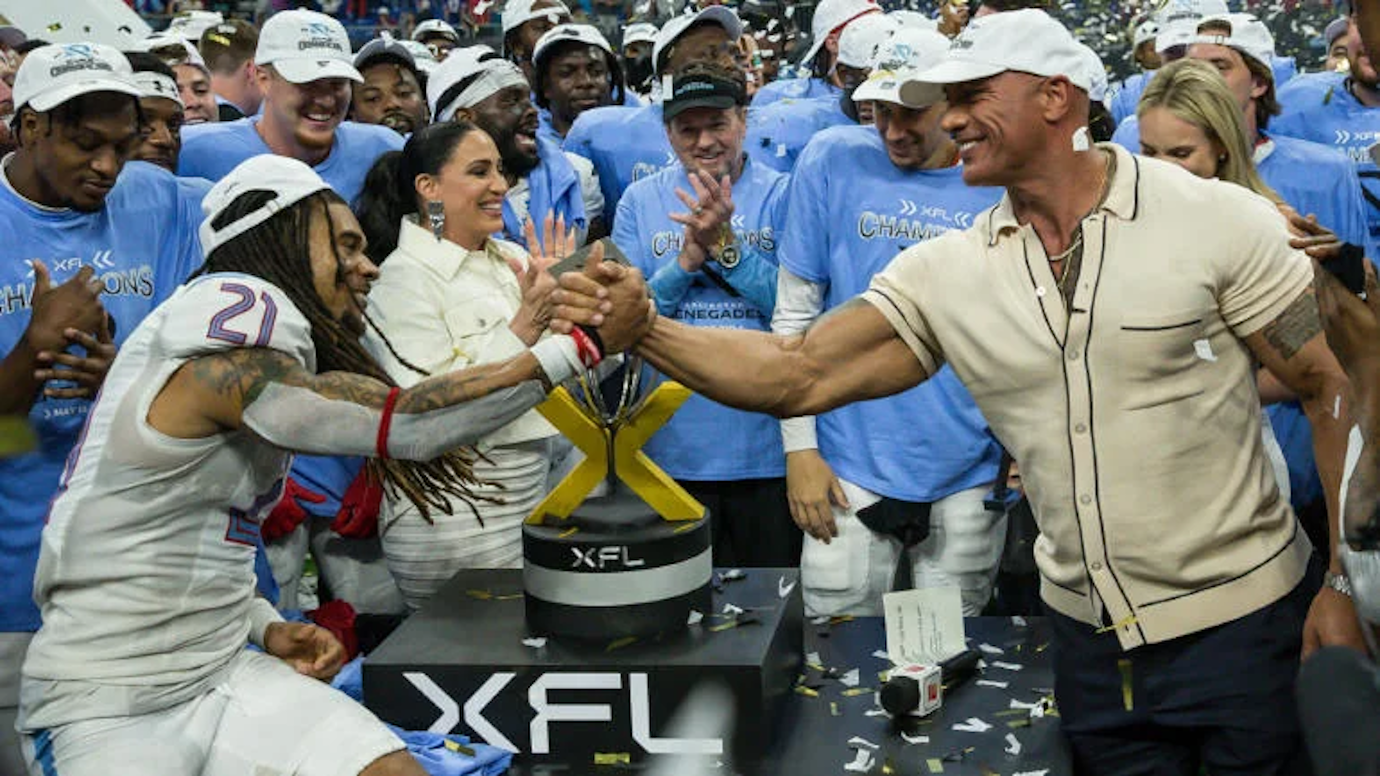By Cody Benjamin
A look to the future of the spring leagues
Spring football has been rolling along in 2023, with new iterations of both the XFL and USFL hosting full seasons. As for whether the NFL alternatives have been profitable, well, that’s another question. USFL executives insist their venture is working despite an average viewership that trails the 2020 version of the XFL, while new XFL owner Dwayne Johnson is championing “the long game” as Forbes reports his league lost an estimated $60 million this year.
The USFL has already made history by becoming the first spring league to return for a second straight season since the original USFL, in the 1980s. The XFL, meanwhile, already has “capital commitments in place” for four seasons, league ownership told Forbes, estimating $100M in 2024 revenue and hyping the business as “our next WWE.”
It’s undeniable that growing a league takes time; a prominent XFL backer compared the venture to the annually expanding Major League Soccer when talking with Forbes, projecting Johnson’s passion project will be “cash-flow positive by 2027.”
But it’s fair to wonder: will fans still care about these spring startups by then?
Historically, they’ve never really gotten the chance. Basically every American NFL alternative except for the Arena Football League, which is aiming for a 2024 relaunch after going bankrupt, has come and gone in a matter of a few seasons. And consistently, primarily, there are three contributing factors: lack of funding, lack of engagement, lack of comparable talent.
With that said, how might the XFL and/or USFL to survive, let alone thrive, for the long haul?
A potential XFL/USFL merger
For starters, they might consider merging. This is far easier said than done. With two different broadcast partners, two different investment groups, and two different rulebooks, a future collaboration — the USXFL, anyone? — would take heavy lifting on both sides. A more likely scenario is one league buying the other, doubling down on the investment, and pooling the player talent.
No matter what XFL and USFL execs say, the reality is the average football fan probably doesn’t have the time to faithfully follow individual teams in each league, let alone the entire league’s happenings, in addition to the NFL. Consider also the general amount of turnover in spring leagues, and it shouldn’t be surprising if plenty have already given up on trying to keep tabs on which cities and franchises are actually active and sustainable, let alone which spring league they’re part of.
In a basic sense, the old “less is more” adage is at play: while NFL fans may crave more football, they don’t necessarily crave an excess of preseason-level football from multiple fledgling leagues. Every spring league or NFL alternative believes it is the one “right” alternative, but when there are so many options in the marketplace, the value of said options becomes diluted. Put it this way: if everyone is offering “legitimate spring football,” then the reality is, well, nobody is.
Both of the current leagues may be sending dozens of players to NFL training camps, but there simply isn’t enough NFL-caliber talent to power dueling leagues of their own. Hence the appeal of a potential merger.
Getting the NFL involved
Another saving grace, of course, might be more tangible NFL involvement. When addressing the XFL’s revival and future, Johnson recently told “The Pivot” podcast that he specifically met with NFL commissioner Roger Goodell before restarting the league, which previously lived in 2001 and 2020. During the meeting, Johnson said he made it clear that the XFL is not meant to compete with “the gold standard” of the NFL, and asked Goodell if there’s “a way we could find a partnership” to grow the game of football.
Goodell’s answer, according to Johnson: “Yes.” But what if that “yes” actually, eventually meant an official connection to the NFL? What if, for example, the XFL became a sort of localized version of the now-defunct NFL Europe, which was once used to “allocate” off-roster players to what amounted to minor-league teams? This would present many hurdles of its own. But it would at least cement these spring endeavors as more of a direct pathway to the league everyone wants to watch and be a part of anyway.
In the meantime, it’s all systems go on the XFL and USFL’s respective fronts. The former, which hosted its 2023 championship game in May, is already selling 2024 season ticket packages for several teams and has Johnson’s endorsement. The latter will close its 2023 season with the USFL Championship on July 1 and has already teased a 2024 expansion.

